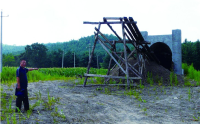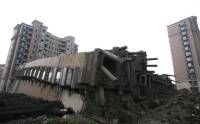

Hot Money Returns to China
News, cover
~ Short-term speculative funds, or hot money, has started flowing into China at an unprecedented rate as the country's economy begins to improve.
~ Some analysts believe that these funds first entered the real estate market and are now moving to the stock market. They also predict that the speculative funds will switch to commodity investment in the future.
~ Wu Nianlu, a professor at the People's Bank of China graduate school, estimates that the amount of hot money flowing in to the mainland has reached between 200 billion and 300 billion US dollars, constituting some where between 10 and 15% of the country's foreign currency reserves.
Original article: [Chinese]
 Tax Inspectors Look to Large Firms as Source of Additional Revenue
Tax Inspectors Look to Large Firms as Source of Additional Revenue
News, page 4
~ In a bid to stem falling tax revenue, which declined by six percent to 2.95 trillion yuan in the first half of 2009, the State Administration of Taxation (SAT) has indicated that it will intensify tax inspections.
~ The inspection bureau of the SAT has increased its annual target for additional tax payments from 70 billion yuan at the start of the year to a more ambitious 100 billion yuan, which is almost twice the 51 billion yuan of overdue tax receipts which were collected in 2008. ~ The bureau has required large enterprises to carry out internal audits. The first phase of which
was conducted throughout 24 flagship enterprises in the banking, finance and telecommunication sectors.
~ The second phase required 34 major companies including Wanke, State Grid, China Oil and Food Import and Export Corporation and Dell to conduct an audit of their tax payments.
Original Article: [Chinese]
Fine Tuning of Macro Policy
News, page 3
~ Chinese economists and policy makers are split over whether China's economy has already recovered from the global downturn or whether it has simply stabilized as a result of the drastic measures taken as part of the stimulus plan.
~ As recent positive signs are mainly a result of government rather than private investment, and with predictions of an inflated property market and what many are already describing as a stock market bubble, there is disagreement about which policy mix will best ensure a sustainable recovery.
~ The State Council has announced that it plans maintain positive fiscal policy and moderately loose monetary policy while continuing to finance the 4 trillion yuan stimulus package. However, they've also revealed their intention to fine tune economic policy when necessary, in order to keep the economy on track.
Original Article: [Chinese]

Compensation for Small Coal Miners
Nation, page 11
~ After their small but legal coal mines were closed down by local governments in accordance with a nation-wide crackdown in 2007, hundreds of coal mine owners in China's northeastern Heilongjiang and Liaoning provinces are having their claims for government compensation ignored.
~ The crackdown, which ordered local governments to shut down coal mines with an annual production capacity of less than 30,000 tons, resulted in millions of yuan of losses, with some mines losing up to nearly 10 million yuan.
~ Yang Zhihai, a lawyer who offered legal aid to these coal mine owners, said local courts declined to accept legal proceedings involved with the forced closure of the mines.
~ In addition, when these coal mine owners went to negotiate with local governments for compensation, officials rejected such pleas on the basis that central authorities had yet to make any measures for such compensation .
~ However, when they appealed to high authorities, they were told that the compensation measures should be formulated by local governments.
Original Article: [Chinese]
 CBRC to Get Tough on Banking Sector
CBRC to Get Tough on Banking Sector
Market, page 17
~ With new loans for 2009 already hitting a whopping 7.37 trillion yuan in the first half year, the risk of bad loans is apparent. However, since the central government has decided to maintain a moderately loose monetary policy in the second half of the year, the pressure is on the China Banking Regulatory Commission (CBRC) to reduce lending risks.
~ CBRC will undertake a nationwide inspection, a combination of a internal-audits by all banks and random spot-checks conducted by the CBRC.
~ Inspections will examine the destination of bank loans, whether capital is allocated in a timely fashion, billing services. They will also play close attention to personal financing and local governments financing services.
Original Article: [Chinese]
Yuan Settlement Pilot - No Action Since Opening
Market, page 17
~ Aside from a few token deals that took place on the day of the official launch of China's new cross-border yuan settlement pilot program that was launched a month ago across a few cities in the Pearl River Delta, no other transactions have taken place over the past month
~ In early July, China launched yuan settlement in five cites, allowing companies to settle imports and exports in RMB. The move was seen to help avoid rate risk in settlement, and also as a small step towards China's goal of internationalising the yuan.
~ The main obstacles to RMB settlement are that foreign businesses are reluctant to accept payment in yuan, inconvenient procedures.
~ Liu Tongde, a finance director at an electronics company in Dongguan suggests that the government expand the trial to cover small and medium-sized Hong Kong enterprises, which have an incentive to transfer capital to Hong Kong from the mainland.
Original Article: [Chinese]  Butterfly Effect: A Building Collapse in Shanghai Causes Steel Prices to Surge
Butterfly Effect: A Building Collapse in Shanghai Causes Steel Prices to Surge
Corporation, page 25
~ In late June, a 13-story residential building that was still under construction collapsed in Shanghai.
~ This high-profile accident led to questions about the quality of steel used in the project, that sparked a flurry of steel quality inspections that expanded nationwide
~ This inspection has led to a surge in steel price that saw the composite steel price index rising by 11.9 percent in July, the biggest monthly jump in 8 years.
~ According to steel mills, inspections led to the production of low-price substandard steel being halted and this had pushed up prices.
~ However, steel traders believe that current demand does not justify such high prices and they suspect steel makers have been hoarding stock to push up prices. They also predict a steep fall in prices in August.
Original Article: [Chinese]

